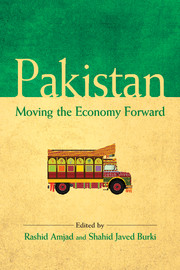Book contents
- Frontmatter
- Contents
- List of figures and tables
- Preface
- 1 Overview
- 2 Failed Economic Promise: Lessons from Pakistan's Development Experience
- 3 Economic Management Under IMF Tutelage: Key Lessons from the Musharraf and PPP Rule 1999–2013
- 4 A Country and an Economy in Transition
- 5 Tackling the Energy Crisis
- 6 Exports: Lessons from the Past and the Way Forward
- 7 The Future Path of Tax Reforms in Pakistan
- 8 Pakistan's Indus Basin Water Strategy: Past, Present and Future
- 9 Economic Governance and Institutional Reforms
- 10 Benefiting from Foreign Direct Investment
- 11 An Analysis of the Remittances Market in Pakistan
- 12 The Prospects for Indo-Pakistan Trade
- 13 Beyond the Poverty Line: A Multidimensional Analysis of Poverty in Pakistan
- 14 Can the New Intergovernmental Structure Work in Pakistan? Learning from China
- Contributors
- Index
3 - Economic Management Under IMF Tutelage: Key Lessons from the Musharraf and PPP Rule 1999–2013
Published online by Cambridge University Press: 05 May 2015
- Frontmatter
- Contents
- List of figures and tables
- Preface
- 1 Overview
- 2 Failed Economic Promise: Lessons from Pakistan's Development Experience
- 3 Economic Management Under IMF Tutelage: Key Lessons from the Musharraf and PPP Rule 1999–2013
- 4 A Country and an Economy in Transition
- 5 Tackling the Energy Crisis
- 6 Exports: Lessons from the Past and the Way Forward
- 7 The Future Path of Tax Reforms in Pakistan
- 8 Pakistan's Indus Basin Water Strategy: Past, Present and Future
- 9 Economic Governance and Institutional Reforms
- 10 Benefiting from Foreign Direct Investment
- 11 An Analysis of the Remittances Market in Pakistan
- 12 The Prospects for Indo-Pakistan Trade
- 13 Beyond the Poverty Line: A Multidimensional Analysis of Poverty in Pakistan
- 14 Can the New Intergovernmental Structure Work in Pakistan? Learning from China
- Contributors
- Index
Summary
Introduction
A fundamental premise of this chapter is that Pakistan's poor economic performance is as much due to poor economic management as it is to fundamental structural constraints. Indeed, poor economic management is an important reason why these constraints persist. This chapter, therefore, assesses how well or poorly the economy was managed during 1999–2013: the period spanning the governments of General Pervez Musharraf and the Pakistan People's Party (PPP). Our aim is to look at what economic policymakers did right and what they did wrong—most importantly, what they did not do and should have done. In assessing this performance, we also critically evaluate the part played by agreements entered into by both governments to obtain financial support from the International Monetary Fund (IMF) to overcome recurring macroeconomic imbalances and possibilities of default on external debt repayments. These agreements and resulting conditionalities, which covered almost half the period under review, also had an important influence in economic decision-making and the way the economy was managed or mismanaged in this time.
In examining this performance, we have not separated the sub-periods covered respectively by the two governments. This has merit in that it allows us to identify the critical economic factors that helped the country break out of the recession of the 1990s, the revival and acceleration of growth in 2003–07, the economic downturn that followed soon afterward, and the outset of the current stagflation that persisted throughout the PPP's tenure, which ended in 2013. In so doing, we avoid merely blaming one or the other government in power for the problems and challenges that arose, and instead attempt to evaluate the relative performance and weaknesses of both in economic management, which were responsible for the economy's inability to move onto a sustainable growth path.
As we shall see, much of the problem that arose as growth first increased and then plummeted stemmed from two factors.
- Type
- Chapter
- Information
- PakistanMoving the Economy Forward, pp. 48 - 83Publisher: Cambridge University PressPrint publication year: 2015
- 1
- Cited by



